#of course the prince being dead the entire time is kind of the whole thesis of the movie
Explore tagged Tumblr posts
Text
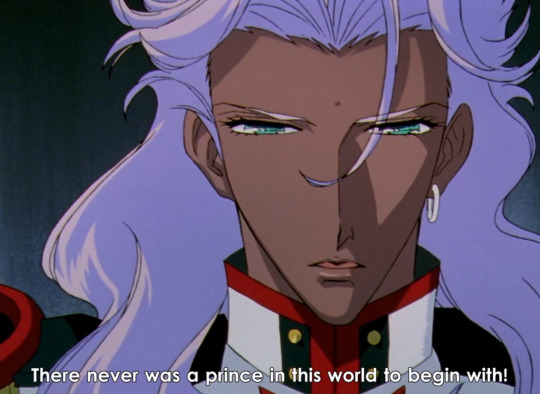
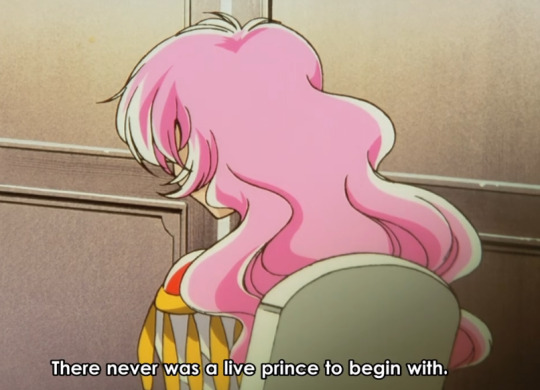
Episode 38 // Adolescense of Utena
#i find it so interesting that utena echoes akio here. especially if you read the movie as a sequel#of course the prince being dead the entire time is kind of the whole thesis of the movie#but that's true for the show too. the prince (the ideal) was never real#akio says it to be manipulative but utena is realizing a fundemental truth about the world. and a huge revelation for her#revolutionary girl utena#adolescence of utena#parallels#utena#akio#m
96 notes
·
View notes
Text
Teen Titans Spotlight #5: Jericho
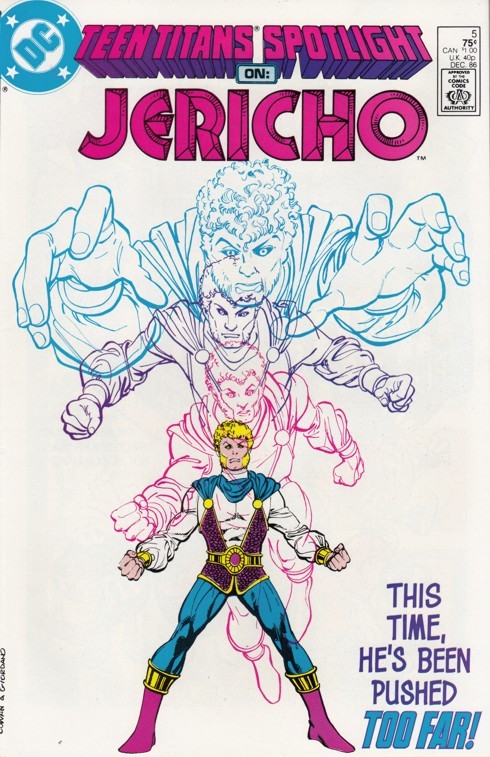
Princess of Gemworld

How will he not know when he finds his fingers have been Crazy Glued to his cock?
With Jericho's powers, I don't know why he needs Garfield's fingerprints. Why not just possess Steve Dayton himself, knock him out so he can't scream for help, and just walk in to grab the promethium? Or hire his dad to get the shit! He could probably guilt Deathstork into doing loads of illegal stuff for him.
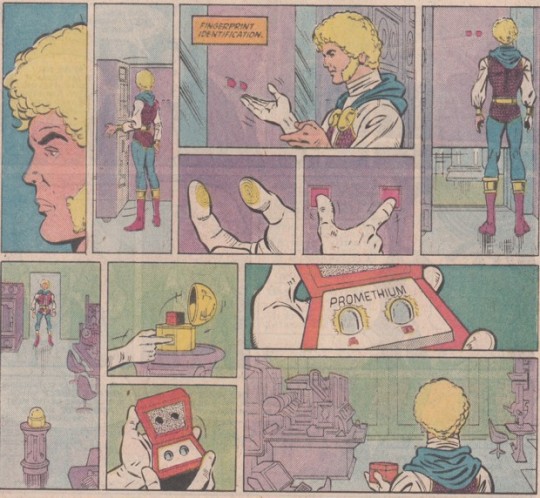
Why would Steve Dayton allow Garfield Logan access to his promethium?! Yeah, I fucking know Logan's his son. It still doesn't fucking make sense!
Jericho takes the promethium back to Arthur Lord so he can trade it to the Quraci government and save his daughter's life. But it's only after Lord leaves Addie's place with the promethium that she says to Jericho, "I think we just got scammed!"
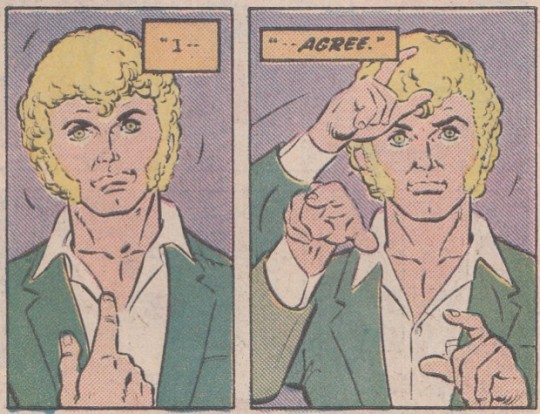
Jericho responds, "I think you're a loser."
Sure enough, Penny and Arthur were just using Joey and his mom to get their hands on the most destructive non-Lobo thing in the DC Universe. Penny is all, "That dupe actually thought I loved him! But we didn't even fuck! I just held a tin of microwaved potato salad between my legs and let him fuck that." That's what sex feels like, right? Fucking warm potato salad? I mean, I totally know that's what it's like. I hope! I mean, I don't hope it feels like that in that I love the feeling of fucking warm potato salad! I hope that's what it feels like so people who have fucked don't think I haven't fucked because I described it poorly. We all have different experiences anyway! You can't invalidate my description of what it felt like when I totally had sex all those times! Joseph, being the biggest dupe of them all, didn't replace the promethium tablets with Sugar Mamas like I would have expected him to do. So now he and his mother have to break into Arthur Lord's secret laboratory and resteal the promethium tablets! If only they had consulted Nightwing, they could have been done with this adventure already. He would have been all, "Man, Joey, you smell like potato salad ! Did you fall for the fake lover with the potato salad between her legs trick? You better not trust her, buddy!" Oh, I was wrong! They don't break into Lord's place at all! They think their smartest move is to break into Qurac and kidnap Curt, Penny's husband! I guess they can use him as leverage. Although couldn't Joey have lifted Penny's fingerprints off of his prostate to gain access to the secret lab? If Joey had the ability to sneak into Qurac to rescue Penny without risking the entire world by giving Qurac promethium, why the fuck wasn't that the plan from the beginning?! I'm starting to sense that maybe Marv Wolfman was on Quaaludes when he wrote this script.
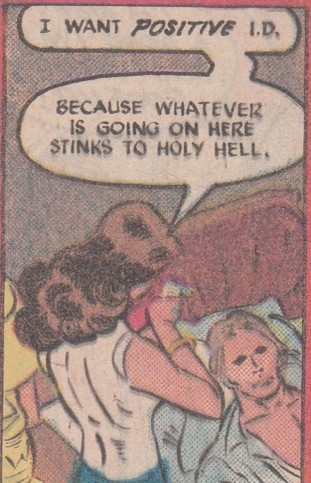
That would be Joey's crotch.
There's an advert for NBC's Saturday morning line-up in this issue and it just makes me wonder: if modern conservatives are so pissed off about everything in our culture that they see as emasculating the kind of man they think every guy should be, where the fuck were they in 1986 while I was watching Kissyfur, The Gummi Bears, Smurfs, Punky Brewster, Alvin and the Chipmunks, Foofur, and Kidd Video?! The most manly cartoon in that list is Alvin and the Chipmunks and they wore dresses! Stop doing the math and trying to point out that I was fourteen or fifteen in 1986! Gummi Bears had one of the best cartoon theme songs (right after Ducktales)! I'm going to go listen to it right now! Joey and Adeline take Curt to Tokyo where they finally begin interrogating him. Even though he spent multiple days being tortured by the Quraci government, he wouldn't tell them a thing. He spends two minutes alone with Adeline and Joseph and he begins spilling the beans. The only threat they used was that Joey was going to put himself inside hi...oh. I see what he's afraid of! Dude, it's nothing to be frightened of! Just relax, man! Joseph's a sensitive poet. He'll definitely provide a reach-around. Joseph infiltrates Lord's secret base and discovers he's resurrecting H.I.V.E. (which stands for Hierarchy of International Vengeance and Extermination which is fucking stupid. Just spitballing for a few seconds and I already came up with a better one: Higher Institute of Violent Extremism!). Joseph's movements are described as catlike which is why he's noticed freaking the fuck out, bouncing off walls, and yowling at the top of his voice. Arthur Lord, leader of an organization full of soldiers who are only in the organization because they killed a bunch of other master fighters, decides to fight Joseph himself. His mighty warriors (the best of the best!) just stand around in robes watching.
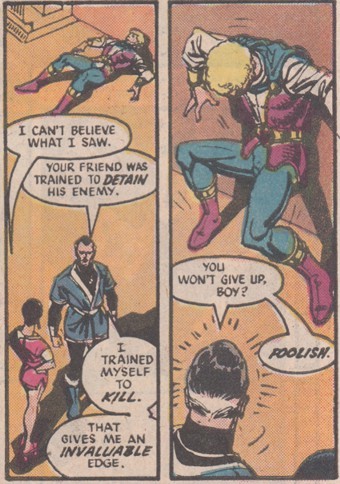
What good is your invaluable edge if you're not going to use it?! Kill the little creep, you idiot!
Arthur Lord tackles Joseph straight through a wall where they both disappear from view. Then he emerges and he's all, "He's dead! And since Joseph can't control the host's talking, I must be myself and telling the truth! Ha ha ha!" But I know better! Remember how I already saw there's another issue in this stupid story arc? Joseph is totally still alive! And probably possessing Arthur! And probably able to speak because Arthur was knocked unconscious! Pshaw! Marv Wolfman, you need better twists! Arthur and H.I.V.E. take off from their secret base to go take over the world. And they won't need the base anymore for some reason, so they just blow up the island on the way out. Ugh, he's the worst kind of tenant. Teen Titans Spotlight #5: Jericho Rating: B-. So much betrayal! So many twists and turns! Not much fucking though. Which makes it a mediocre Teen Titans story. And yes, the B- factors in the fact that this whole conflict is, once again, somehow driven by family.
3 notes
·
View notes
Text
The Tempest
I started my reading list with The Tempest because it’s the first one in my copy of The Complete Works. It’s also a little bit poignant because Tempest is one of those plays that People believe “means” something about Shakespeare (or, as he will be colloquially referred to on this blog, Billy Shakes). It was probably one of his last plays, and because it’s about an old man giving up his craft, People say that it is about Shakespeare giving up The Theatre.
I don’t know about all that. What I do know that Shakespeare had daughters, and that the way he wrote father-daughter relationships is very particular and interesting. However, using his plays to try and expose truths about the playwright can be really unproductive. I’ve tried it and it’s hard and usually wrong. That being said, the plot is pretty wild.
[what follows is a plot summary. for hasty, last minute thoughts, skip to the end.]
Act One
Surprise! It’s about a tempest! We open in Act 1 with a storm, and a ship caught in the fustercluck.
The Boatswain and Shipmaster are like, “Nooo!” and the passengers are like, “Please God, I don’t want to die at sea! I want to die on land!” (1.1.63-65)
These passengers are: Alonso, the King of Naples, his brother Sebastian, his son Ferdinand, his counsellor Gonzalo, and Antonio, the Duke of Milan. Basically, the who’s who of Italy.
After this expository storm scene, we jump to a nearby island to meet our protagonists, Prospero (old, weird, presumably funky smelling), and his daughter, Miranda (young, nubile). Also, Miranda is the only female character in the play, which means we’re off to a really great start of continually failing the Bechdel test.
“Papa,” Miranda says, probably. “What is up with this freaky storm? Is that a shipwreck over there? Also, who am I?” (1.2)* (See notes at the bottom re: Miranda’s questions, memory, and this entire exchange.)
Here’s the deal: Miranda is fifteen, and has never met anyone other than Prospero, her father, or Caliban, the dude he keeps chained up in a cave for reasons that will become clear (but make that fact no less alarming).
Prospero, on today of all days, decides to be honest with Miranda about his past and her identity. This is a classic Billy Shakes move: exposing the noble lineage of a character to move the plot along. The sad tragic backstory is this: [cue violins]
Prospero used to be the Duke of Milan. Antonio is his evil, scheming, usurping brother. (Gasp!) Back when Miranda was a toddler, Prospero spent all his time reading magic books, and his brother was like, “I should be the duke!” King Alonso was in on it as well, and they shoved Prospero and Miranda on a boat and left them out at sea. Gonzalo gave them food, clothes, and water, but more importantly, the magic books! (Thanks, Gonzalo.) They eventually made it to The Island, where Prospero was like, “Chill,” and set up camp for the rest of time. (1.2.36-173) (It’s a long story.)
So the storm is Prospero’s revenge. He’s gonna really make life hard for the guys on the boat. (1.2.180). Miranda tries to ask another question, but her dad spells her to sleep instead, naturally.
This is where we meet Tempest’s real MVP: the spirit Ariel. Unfortunately, we don’t get to see him in action just yet. Instead we hear his tragic backstory. [Violins again, please.]
Before Prospero came to the island, it was ruled over by an evil witch named Sycorax. (Notice how men who practise magic are good magicians and women who practise magic are evil witches? Yeah, that’s a thing.) Prospero killed Sycorax, freed Ariel from the tree he was captive in, and then immediately enslaved him again. (1.2.257-293)
Prospero has promised Ariel that he will free him, as long as he follows through with the plan to separate, torment, and punish the shipwreck victims. Ariel’s like, “Already on it, boss.” And he flies away. (1.2.300)
When Miranda wakes, they go visit Caliban, Sycorax’s son! Wild. He collects their firewood and complains about it, mostly.
Meanwhile, Ariel has found Prince Ferdinand and is luring him in with sweet music. Miranda, who has never seen a man who is not a) super old or b) horribly disfigured, immediately falls madly in love with him on sight. Too bad, so sad, Prospero locks him up.
Act Two
We open on Antonio and Sebastian, who – I’m not gonna lie – I have always gotten a weird evil lovers vibe from. Is that just me? Probably.
They put their heads together and decide to kill the king, who is super bummed out because he thinks his son is dead. So if he dies, then Sebastian would be the new King of Naples! And Antonio would be the Duke of Milan and they could have slumber parties! Flawless plan. But as they go to behead the sleeping men, Gonzalo wakes up.
“Hey guys, what are those swords for?” he asks.
“Uh… we heard a monster?” they say, you know, like liars.
They don’t know how right they are, as we cut to–
Caliban, who is chopping wood (naturally) and starts to soliloquize on how much he hates Prospero, which is pretty understandable. I mean, a guy comes and kills your mother, steals the land you grew up on and were destined to inherit, and then enslaves you? That’s a huge bummer.
Enter Trinculo, the court jester, who was also in the shipwreck. The scene that follows is slapstick AF, providing a much needed break in the action of Slavery this and Drowned Souls that. He and Caliban end up under the same cloak for shelter from the storm, and Trinculo says, “Misery acquaints a man with strange bedfellows!” (2.2.42.)
Too true, Trinculo. Too true.
Another survivor, the butler Stephano, rocks up, only he has a whole lot of wine with him. Get in, buddy. He thinks that Caliban and Trinculo look like a weird beast, and decides the best course of action is to feed it the rest of the wine. Caliban gets smashed, immediately. Then Trinculo pops out and says, “Stephano, buddy! It’s me!” Happy friends are reunited, and now have a drunk, pliable, and desperate Caliban believing that they are gods and that wine is divine nectar, and that they’ll be able to kill Prospero! Sounds logical.
Act Three
Because there’s not much to do on an island populated by three people, Ferdinand is the new Caliban and is in charge of woodcutting. He waxes poetic about how the work is hard, but his love for Miranda makes it all okay. (i.e. “This work is hard, but I am harder, eh-hey!”) (3.1.1-15)
It’s cool though because it’s totally mutual. Prospero isn’t too keen on it, and is spying on them from a distance like the creepy, overprotective father he most certainly is. He’s conflicted because Miranda has never been happier, but also his baby girl is growing up! [violins, again]
The important thing about this scene, I think, is the language about servitude. We’ve seen a whole lot of different kinds of servitude in the play so far - mostly, you know, involuntary. Miranda and Ferdinand exchange willing, voluntary vows, declaring their love for and service to each other. (See, kids? Love is a prison.)
Meanwhile, on another part of the island, Stephano and Trinculo are getting Caliban even drunker.
More importantly, Ariel comes in, invisible to them, and plays them some kickass tunes on his pipe. This is where one of the best known passages from the play comes from.
Caliban
Be not afeard. The isle is full of noises, Sounds, and sweet airs, that give delight, and hurt not. Sometimes a thousand twangling instruments Will hum about mine ears; and sometime voices, That, if I then had wak’d after a long sleep, Will make me sleep again; and then, in dreaming The clouds methought would open and show riches Ready to drop upon me, that, when I wak’d, I cried to dream again.
(3.2.130-137)
I love this part because this is where we finally start seeing the island for what it is: a haunted fairytale world. Caliban, who’s lived there all his life, doesn’t know what the noises are, or even the spirits that make them. His connection to the island is so innate and deep that he doesn’t question this mystery, just accepts it. It’s *clenches fist* so beautiful.
Back with the merry group of Italian Nobles, shit is about to get real. They’re busy complaining about their feet being sore, or whatever, and then… “solemn and strange music; and PROSPERO on the top, invisible.”
Strange shapes enter the stage with a banquet. Sebastian is like, “Cool, I believe in unicorns and fairies now, this is absolutely nucking futs.” (3.3.22)
Before the nobles can eat, though, the greatest ever stage direction I’ve ever read in my life.
Enter ARIEL, like a harpy; claps his wings upon the table; and, with a quaint device, the banquet vanishes.
First of all: enter Ariel, like a harpy? Can you think of anything more beautiful and terrifying than seeing a giant bird-spirit with an enormous wingspan emerge from the air, slam its fists down in front of your face, and vanish everything there? This is why Ariel is my MVP. He’s just such a drama queen.
I’m also hugely fascinated by the “quaint device” situation, here. There’s a good chance my MA thesis will be on magic/witchcraft on stage. As Tempest is a late play, probably 1610-11, it was written and performed under King James, who was obsessed with witchcraft. Magic tricks weren’t just slight of hand, back in the day, they were fully, completely real. The audience, the actors, and the king all believed in the supernatural.
Anyway, Ariel makes this big speech about how he is a spirit of vengeance who is there to punish them for what they did to Prospero, before vanishing in thunder.
Act Four
“Sorry I, like, imprisoned you, or whatever,” Prospero says to Ferdinand. “But you can totally marry my daughter. As long as you don’t bone her until after the wedding. Or else I’ll do… something. Something magic and weird.” (4.1.1-23)
“Cool,” says Ferdinand.
Ariel, when Prospero asks, brings down the spirits/deities Iris, Ceres, and Juno to bless the union. Then some nymphs, then Reapers. Which reminds Prospero suddenly! Caliban, Stephano, and Trinculo were on their way to kill him! Yikes.
With the help of Ariel’s trusty invisibility cloak, they manage to spy on them, and then set dog/hound spirits on them, and scare them away. Too easy.
Act Five
Finally, Ariel is going to be set free! After god knows how many years stuck in a tree stump, and thirteen years at Prospero’s beck and call, he’s going to be set free!
Only no.
What proceeds is a super sad scene where Ariel, telling Prospero how the Merry Italians are faring (spoiler: not well), feels a deep tug on his ol’ sympathy wire. Or, rather, “Mine would, sir, were I human.” (5.1.19)
Who is the monster and who is the man? Huh? HUH?
While Ariel goes off to fetch the shipwreck victims, Prospero makes an awesome speech about how cool and powerful his magic is, and how, alas, he is going to give it up. Because he cannot be a wizard and a Duke, can he? Also, it seems to me that his main power was, you know, enslaving people and spirits who can do his bidding. Not exactly kosher.
Ariel returns with the Italians and Prospero finally confronts them. Of course, they’re like, “Are you real? I’ve seen so much crazy crap today I wouldn’t be surprised if you were a figment of my imagination.”
But no, he has a pulse, and he has aged, and he is real!
He confronts everyone, left and right. Sebastian, Antonio, Alonso - nobody is safe! (Except for Gonzalo who he’s chill with.)
He even gives them a twist by saying, “I’ve lost my daughter…” and while they’re like, “NO!” he says, “PSYCHE! I meant because she married the prince! Booyah!”
Meanwhile, Ariel repairs the ship, fills it with supplies, and sends the captain to pick everyone up.
“FREE ME!!!!” he seems to be screaming, through clenched teeth.
Caliban, Trinculo, and Stephano all emerge, in stolen clothes, reeking of wine and, probably, their own piss. Everyone heads back to the ship, bound for Milan.
But first - “My Ariel, chick / That is thy charge. Then to the elements / Be free, and fare thou well!”
Finally. Finally.
Epilogue.
To be fair to those who think Prospero is kinda sorta Billy Shakes himself, Prospero’s epilogue sounds a lot like an old man giving up his trade, there on the stage. In fact, he begs to be set free from it.
Really, it was Prospero who was the slave all along. A slave to his circumstances, his trade, his life. Heavyhanded? Yes. An attitude that maybe diminishes the suffering endured by the actual slaves in the story? Probably. But in the end, it’s Prospero who needs to be freed from the shackles of the play, of magic, of fury, a quest for revenge, and his life on the island.
What makes Prospero’s epilogue sound like a speech being given by Shakespeare is that he asks the audience for permission to step down: “As you from crimes would pardon’d be, / Let your indulgence set me free.” (19-20)
Only can the audience set him free - not the other characters. The epilogue happens for us, not for the sake of the plot on stage. It is our job to pardon Prospero for his crimes. Our job to let Shakespeare put down his pen, I guess.
My real interest in Tempest is, as I said, in the stagecraft of it, and the implications of performing, or re-enacting the supernatural on stage. I’ll likely think about this more when it comes to things like Macbeth, Midsummer, or any play with supernatural elements, like Hamlet.
Other fascinating points:
colonialism/land ownership
colonialism and language - (Caliban: “You taught me language, and my profit on’t Is I know how to curse. The red plague rid you For learning me your language!”)
that Ariel was freed from the stump implies that he was captive in the land. I’m sure there’s some kind of eco-criticism about this, somewhere, but I don’t know if I care enough about eco-criticism to follow it up
Memory
Antonio has convinced himself that he did not wrongfully usurp his brother, for instance.
Miranda cannot remember… anything? (See Kevin Ohi (2015), ‘Forgetting the Tempest’, in Dead Letters Sent: Queer Literary Transmission (pp. 49-66). University of Minnesota Press.)
The way in which Prospero constantly qualifies the story (1.2), asking her if she’s listening, if she’s paying attention, etc. implies that she might not be listening, that she perhaps can’t pay attention, that she might not remember. Despite knowing that the shipwreck victims are alive and safe, Miranda let’s Ferdinand believe that his father is dead - or, perhaps, she does not remember that Alonso is alive.
Caliban’s memory of his mother, of his island, of his childhood - it leads us to the question of who is the custodian of knowledge, of memory, for a place?
Performances and rituals
magic, marriage, masques (oh, i like the sound of that.)
And yeah. What a plot summary. Catch me never writing one again.
Things to accompany The Tempest:
Margaret Atwood’s Hag-Seed
The Little Mermaid and/or Pocahontas
Julie Taymor’s The Tempest (2010) where Helen Mirren plays Prospera.
“The Island: Come and See/The Landlord’s Daughter/You’ll Not Feel the Drowning” by The Decemberists.
17 notes
·
View notes